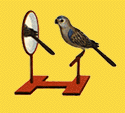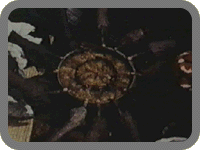 |

|
 Jean Rouch, |
An ethnographic monument whose images of rituals involving trance, considered shocking at the time, appealed to the French Surrealists and also provided the inspiration for Jean Genet's vehement anti-colonial play Les nègres. Leaving this fascination for exotic spectacle (and Rouch's biased Marxist analysis) aside, the film sketches a penetrating portrait of altered rituals. The members of the Haiku movement in Nigeria, which was formed in the twenties, become possessed by the spirits of the colonial administrators and mimic the white man (and his wife). In 1953, before independence, Jean Rouch filmed a Haiku ceremony and explains who is imitating which colonial officer, while the participants strut past their "Government Palace" : a high, festively painted anthill. At the end the film-maker suddenly shows a great military parade not two hours away from this excessive "fancy-dress party", where the real governor is inspecting his troops. In Ghana, the British authorities banned the film for allegedly insulting the Queen. Rouch himself forbade the film to be shown to those whom he filmed during their trance. When they saw themselves in that state they again immediately went into a dangerous trance... |
Une Journée dans une Famille Belge |
My Crasy Life |
The Simple Song |
Trobriand Cricket |
Gender Crash |
Shut the Fuck Up |
 |
|
|
|
 |